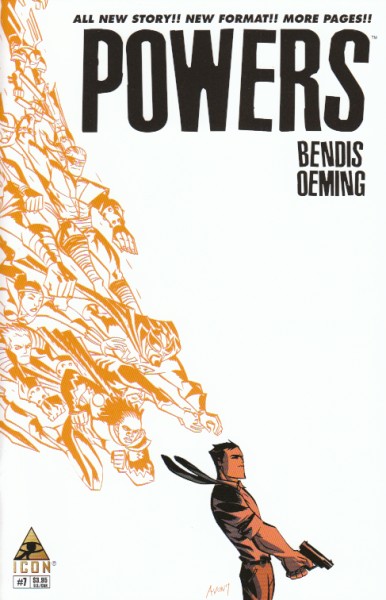Powers 7
Reviewed by Martin Skidmore 07-Mar-11
Powers was always a winning idea: ordinary cops investigating super-powered crimes. By now, Bendis has raised the stakes some, in that our pair of cops are investigating the death of the demigod Damocles.
Powers was always a winning idea: ordinary cops investigating super-powered crimes. By now, Bendis has raised the stakes some, in that our pair of cops are investigating the death of the demigod Damocles. He handles the conversations between basically ordinary people and gods beautifully: “I am Kronos, son of Uranus and Gaia.” “I am Enki, daughter of Doris and Larry.” (Admittedly that might work even better had Bendis not given one of his main cops a god’s name, but if that crossed his mind at this point it was clearly too late to change it.) There’s lots of stuff like this – Enki is rather contemptuous of these superbeings’ claims to godhood, and nothing in here confirms or denies that status, but the characters interrogated by the detectives do seem to be far from ordinary superheroes.
I don’t know why, but I lost touch with this series, despite liking it enough to buy the first nine books – it was those and Alias that made me a committed Bendis fan. I must catch up on what I’ve missed. I’m grateful that my comic shop suggested this to me, as this issue starts a new story, bringing back main man Walker’s previous partner, Deena, now with the FBI. Walker used to be a superhero himself, until he lost his powers – and only Deena knows he has powers again now.
Those powers play no part in this – it’s all conversations, between Walker and Enki, both of them with Deena, a TV presenter talking about these so-called gods, and a bunch of interviews with those gods. I think Bendis is one of the greatest writers of dialogue comics has ever had, and these conversations are sharp, meaningful and very witty. I particularly liked the oblique talk with Hecate, which I expect to prove very significant.
I like Oeming’s art a lot, and he is perfect for this. His blocky but loose animation style combined with a noirish sense of darkness gives the right mood and sensibility, and there is plenty of personality and restrained expression in his faces and figures. He also designs a bunch of excellent pages here – it has to be faced that most of the way Bendis gives him nothing to depict beyond people talking to each other. There are only three panels I could see where anything else happens, and Oeming superbly makes the uneventful parts compelling and striking.
I’m also pleased with the greater length here: the story gets 31 pages. Bendis kind of needs this. He’s done better than I would have expected at action-packed stories on the Avengers titles in recent years, but most of his best work runs at a very slow pace – he’s obviously the leader of the ‘decompression’ move of recent years, and I try not to blame him for its many bad aspects and applications, but the fact remains that he seems often to write for collections rather than issues. He can pull this off – he’s one of few writers in comics who can regularly give you talk-only issues without it being a total bore, but others trying it frequently fall flat on their face. Nonetheless, it can mean a story moves very slowly, so getting a chunk more of it in one gives him the chance to add a shock development at the end while still having tons of space for the talking.
I know this doesn’t have a .1 after the issue number, but it really is an excellent jumping-on point for new readers. If you’ve not tried this series before, I enthusiastically recommend picking this up.
Tags: Brian Michael Bendis, Icon, Marvel, Michael Avon Oeming, Powers